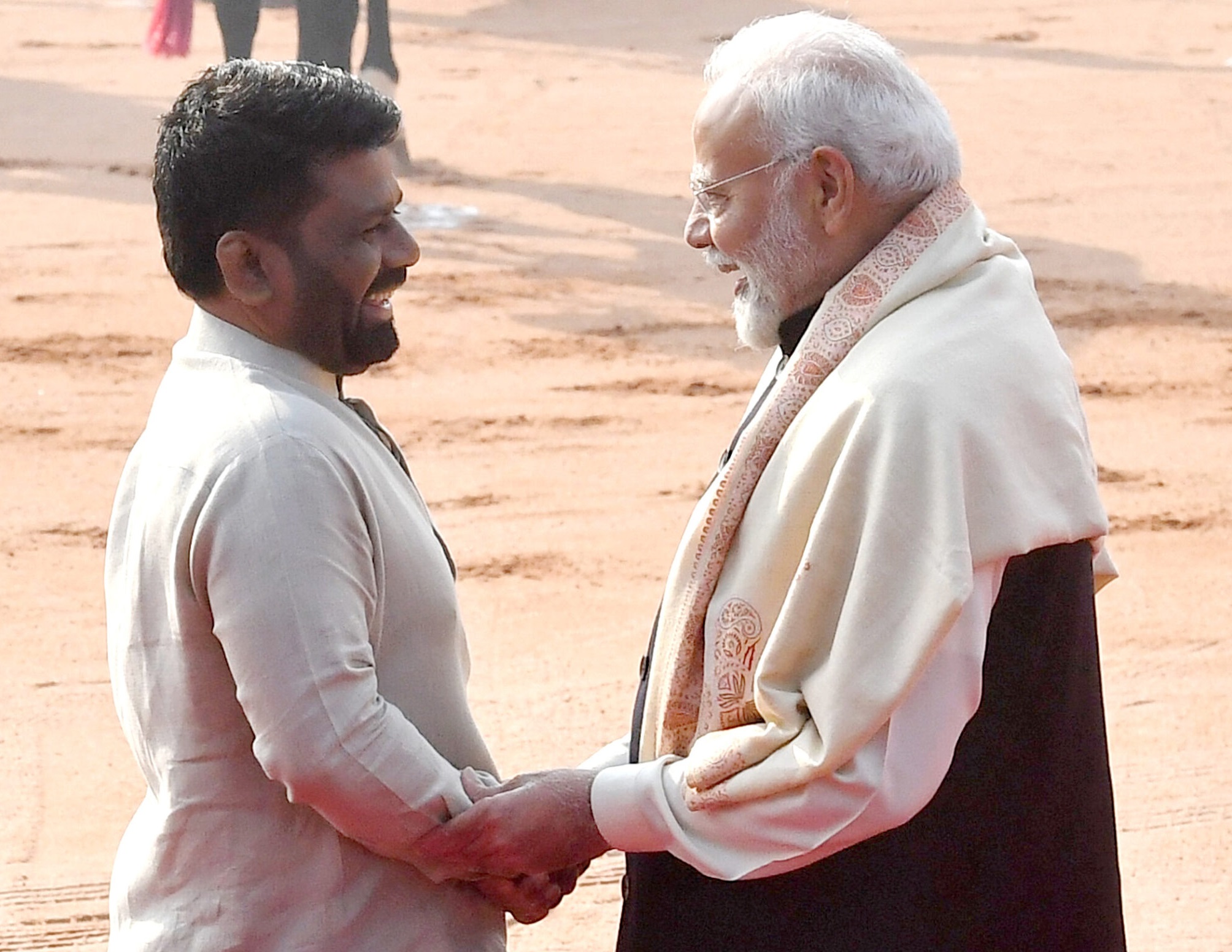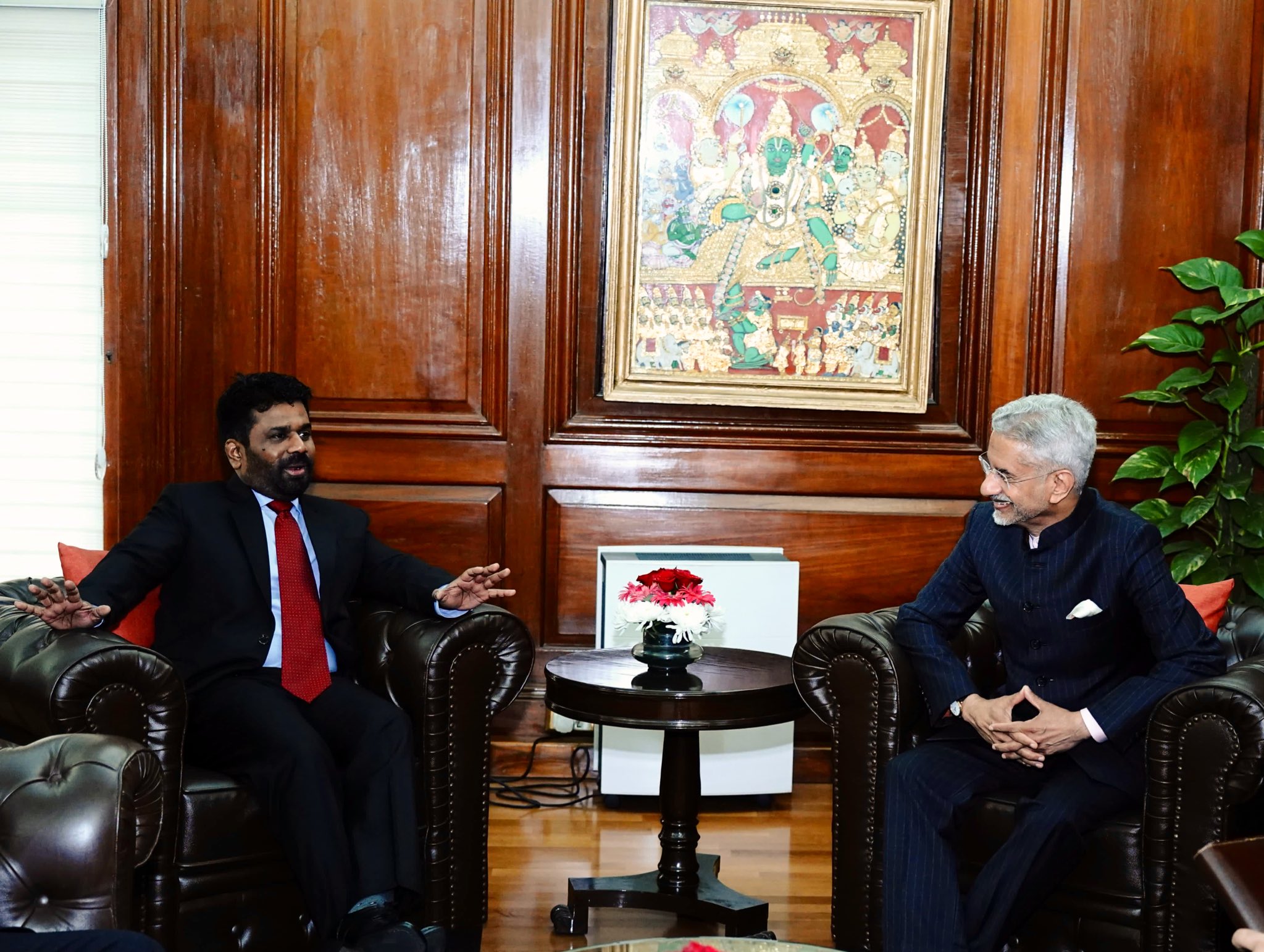
In a stunning reversal, Sri Lanka’s President Anura Kumara Dissanayake is poised to sign a defence pact with Indian Prime Minister Narendra Modi, in a move that cements an about-turn from his formerly fierce opposition to Indian influence in Sri Lanka.
The deal comes alongside a new energy project that will see the Mannar region connected to Tamil Nadu through underwater cables, effectively integrating Sri Lanka’s electricity grid with that of southern India. For a man who just last year decried exactly this kind of deep strategic interdependence with India, the pivot is dramatic.
On 19 August 2023, addressing a meeting of the Vishramalath Hamuda Samuhikaya, the National People Power’s Sri Lankan military veteran association, Dissanayake lambasted such proposals in no uncertain terms. In one of his most fervent anti-India speeches, he thundered:
“Ranil Wickremesinghe went to India. He arrived at a certain Memorandum of Understanding. What is the agreement that Ranil Wickremesinghe signed? A country that is connected with India by electricity cables; a country connected with India by oil and gas pipelines; a country connected with India by currency units; a peoples connected with India by cultural connectivity; a country connected with India by air, sea and land! What will happen? Isn’t there a question? There is a question! On what [basis] must we have transactions with any country? We must have the freedom to freely move our hands and legs! But with this agreement, we will be in a situation where we are unable — isn’t that so? — to take any political or economic decision apart from India!”
This wasn’t an off-the-cuff remark. It was a continuation of a long-standing political ideology. Dissanayake’s party, the Janatha Vimukthi Peramuna (JVP), has for decades positioned itself as fiercely Sinhala nationalist and anti-Indian, accusing New Delhi of seeking to subjugate Sri Lanka politically, economically, and even militarily. During the 1980s, the JVP was the most vocal and violent opponent of the Indo-Lanka Accord in the South, launching a deadly insurrection against the agreement.
In the 2008, as a Janatha Vimukthi Peramuna (JVP) MP, Dissanayake said “a secret plot has been hatched to hand over Katchatheevu to India,” and vowed that such a plan “cannot be allowed to succeed at any cost”.
In 2016, as India pursued the Economic and Technological Cooperation Agreement (ETCA) with India, Dissanayake warned that such a deal would invite the “lowest strata” of Indians to Sri Lanka. The then-MP called on Sri Lankans to “rise against” the deal.
“Some said Ranil was an economic expert. But his strategy is all about selling, and sacrificing. He wants to sell state enterprises; sacrifice state institutions and natural resources – by signing agreements such as ETCA to open the service sector which will have dangerous repercussions,” Dissanayake said.
“We must launch a struggle and defeat the government’s plan of signing this agreement in India. They are lying about this agreement,” he concluded.
In 2021, he joined protesting workers as they demonstrated against Indian involvement in the East Container Terminal (ECT) at Colombo Port.
His deputy, Foreign Minister Vijitha Herath, has perhaps been even more steadfast. In 2008, he warned, “We urge the Indian government to stop trying to buy us”. Herath claimed that New Delhi had "intensified interference" in Sri Lanka and jeopardised the sovereignty of the mineral, fuel and power sectors:
"India is now trying to dominate the power and energy industry of the country through the proposed Sampur coal power plant (in the east) and the power sharing scheme between south India and Sri Lanka. Agreements were also signed giving authority for India to drill off-shore oil wells, to buy the Kankesanthurai (KKS) cement factory (in the north) and to build the coastal railway track".
Even in early 2024, just months before the NPP swept to power, Herath publicly declared, “As a political party we strongly opposed the Indo-Lanka Accord decades ago, and dedicated our initiatives to safeguarding Sri Lanka’s sovereignty, at the cost of many lives".
"This stance has not changed and will not change,” he claimed.
But clearly, the anti-Indian sentiment they once held, has.
Now, Dissanayake is signing the very kind of agreements he once vowed to resist. Herath, too, stands beside him, overseeing foreign policy shifts that are far removed from their party’s historic position.
 (Photo courtesy: Dr. S. Jaishankar X)
(Photo courtesy: Dr. S. Jaishankar X)
What has changed?
The turning point appears to have come in early 2024, when both leaders were invited to visit New Delhi, just months before the Sri Lankan elections. That visit, billed at the time as a pragmatic move, seems to have been the beginning of a complete strategic reorientation.
Since then, the NPP leadership has not only softened its rhetoric but has moved to actively court Indian investment, energy partnerships, and even military cooperation that it once violently decried. Projects like the proposed Mannar–Tamil Nadu electricity link - once used by them as rhetorical fodder for nationalist warnings - are now being implemented under their watch.
Such a pivot might be welcomed by geopolitical pragmatists or the New Delhi establishment. But it also raises uncomfortable questions about integrity, consistency, and stability.
For decades, both Dissanayake and Herath built their careers on a platform of resisting Indian dominance. Today, their government is ushering in some of the most significant strategic partnerships with India in Sri Lanka’s post-independence history. There has been no internal reckoning, no party debate, and no meaningful effort to shift the mindset of the Sinhala polity — much less their own party base — that has been cultivated on suspicion and resistance to Indian power.
This lack of ideological groundwork makes any such agreements fragile. Indeed, this is not the only position that the NPP seems to have switched on. From opposing the implementation of a strict International Monetary Fund (IMF) program to the pledge of repealing the longstanding Prevention of Terrorism Act (PTA), Dissanayake has turned his back on a host of beliefs and promises that he seemingly held before taking up office. How can a party that can reverse its positions so quickly after a whiff of political power be trusted to stand firm on complex international partnerships when pressure mounts - either from within or beyond its borders?
The NPP’s sudden embrace of India might be a geopolitical necessity in the current moment, but it is neither principled nor durable. Without building political consensus at home, without educating their base on why these agreements matter, and without being transparent about what they are conceding and why, Sri Lanka risks sabotaging the very deals they are rushing to sign.
In their rush to New Delhi, they may have forgotten that a real and lasting foreign policy requires more than just a handshake and a signature.
